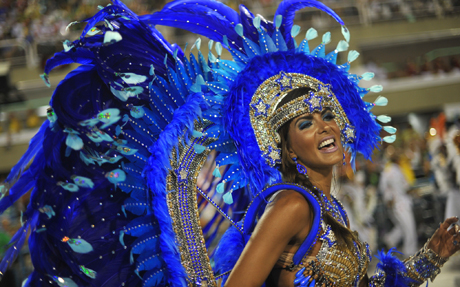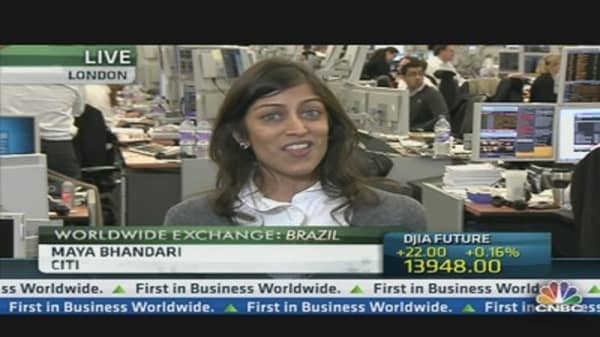As raucous Latin American rhythms, colorful processions and street parties go, Brazil's Carnival is among the best, but Citigroup's strategy team is questioning whether the party for Brazil's economy could be over before it's really begun.
(Getty Images)
The five days of celebrations began over the weekend against a backdrop of national pride and optimism. The main carnival in Rio de Janeiro contributes $628 million to the country's economy and has added around 250,000 temporary jobs. The world-famous samba parade of exotically dressed "carnival queens" and bands generated $42.8 million in ticket sales, advertising and TV rights.
But the celebrations come as economic growth slowed to less than one percent in 2012. At the same time, inflation risks are rising and the currency has strengthened - providing warning signs that all is not well for the "BRIC" economy.
Maya Bhandari, director at global macro strategy at Citigroup told CNBC that the bank expected a "relatively weak" recovery in Brazil this year, with growth of just 0.3 percent,as the country failed to capitalize on the turnaround in its main trading partner China.
Brazil's economy had been on a tear in recent years growing 7.5 percent in 2010 on booming commodity exports before slowing to 2.7 percent in 2011.
"We think of Brazil as one of those countries that is hurting a little bit because it's not gaining from the recovery that we've seen in China like a lot of the other Asian economies,"she told CNBC on Monday.
(Read More: Why Brazil's Once Booming Economy Is Losing It's Shine)
"Brazil is intensely commodity and China dependent and China's model of growth is changing away from commodities towards domestic demand and that has interesting implications for a country like Brazil."
Brazil's central bank has reportedly stepped into the currency markets in recent weeks to weaken the real, in an attempt to counteract what Brazilian Finance Minister Guido Mantega has called global"currencies wars" – the competitive devaluation of currencies in order to increase exports.
(Read More: Global Currency Wars Could Get Nastier, Says Brazil)
Brazil has also been trying to stem the massive influx of investments in the country,which caused the real to become one of the most overvalued major currencies in recent years.
"The Dollar/Brazil has finally broken below 2 – interestingly it fell below 2 on a central bank intervention and it has stayed below 2 since- and I think that helps takeout any inflationary concerns out of the Brazilian economy," Bhandari said.
Any hikes in interest rates were unlikely, she said, "not least because you have a stronger currency now, so you're having some tightening in monetary conditions in aweak economy already," she added.
The Carnival festivities are drawing particular attention as a demonstration of how well the country can manage big events ahead of next year's soccer World Cup and the Olympic Games in 2016.
Bhandari said that the economic benefits of the recent Olympic games in the U.K. and China were "fairly standard" and the same should be expected in Brazil.
"The key point to make about the Olympics and World Cup is that they tend to have fairly standard effects on the economy…you have really a very temporary fiscal boost in the two quarters in the run-up to the event and then what happens in the actual quarter [of the Olympics] is a little dubious,"she said.
"It depends on how local and foreign consumers respond and after that you end up almost exactly where you began. So the way to frame things, these things in Brazil is a perfect temporary fiscal boost. We don't think it will be anything sustained," she added.





